The Functions of Amino Acids
Table of Contents
The Ajinomoto Group has been studying amino acids since its founding over 100 years ago. Our research has not only helped to explain how amino acids function, but also yielded a wide range of new materials and technologies created using amino acids. When we talk about the power of amino acids, we are referring to all of this.
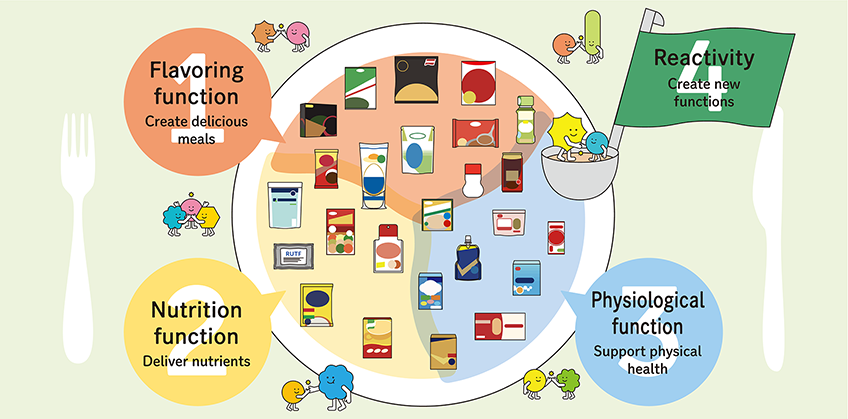
Amino acids, and the new materials and technologies obtained through amino acids research, make foods more delicious, promote growth, development and recovery, and support physical health. The Ajinomoto Group is using these functions to solve worldwide health and nutrition challenges related to eating habits and aging.
The Power of Amino Acids
The Functions
Making foods more delicious
Flavoring function

Amino acids have taste.
Amino acids have a distinct taste: umami, sweet, bitter, sour and salty . Different combinations of amino acids are key to determining how foods taste. When used effectively, amino acids can make foods taste more delicious.
For example, it is well known that the amino acid glutamate, which has an umami taste, makes foods more delicious.
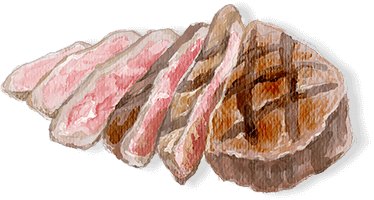
Amino acids research has led to improvements in how foods taste. But texture, aroma, and appearance are also key to deliciousness. For example, that mouth-watering smell and pleasing brown color of cooked foods is the result of a substance created when amino acids react with sugars. Amino acids are also used to develop enzymes that affect texture.
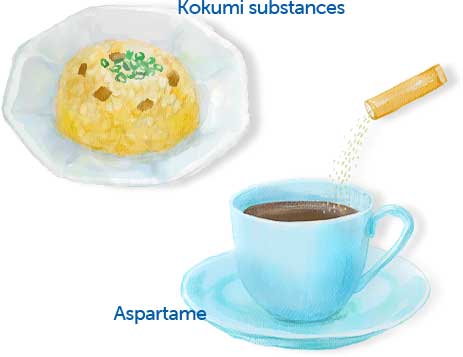
Years of studying amino acids and taste perception have enabled us to discover and develop sweeteners such as aspartame, and kokumi substances that impart richer, deeper flavors to foods.
The flavor modifier γ-PGA, a polymer of glutamate, is key to making foods taste delicious while reducing sodium.
Promotes growth, development, and recovery
Nutritional function
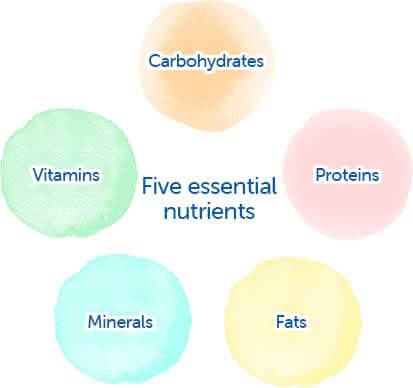
Amino acids are the building blocks of proteins, one of the five essential nutrients.
When we eat, protein is broken down into amino acids and absorbed by the body. In other words, by ingesting protein we are getting amino acids. Amino acids play various roles in supporting physical health, such as building muscles, bones, and internal organs, and supplying energy to the body.
Amino acids promote growth, development, and recovery. They are essential for sustaining life.
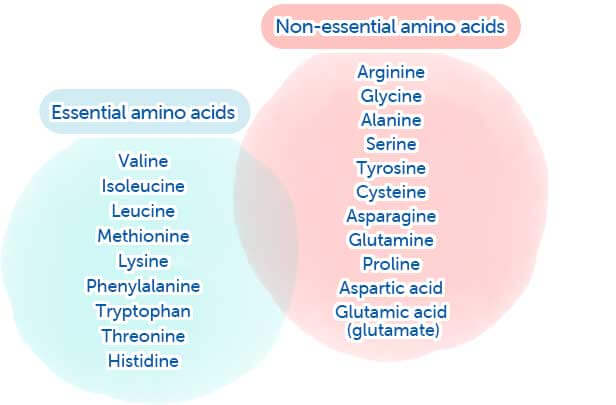
There are non-essential amino acids the body makes itself, and essential amino acids that it cannot. Through our research, we now understand the roles that various types of essential amino acids play and how much of each of them we need to remain healthy.
A good balance of essential amino acids is what makes proteins a valuable source of nutrition. Plant-derived proteins tend to be more sustainable than animal-derived proteins but are sometimes lacking in essential amino acids. By adding these essential amino acids to plant-based foods, we can increase their nutritional value.
Supporting physical health
Physiological function
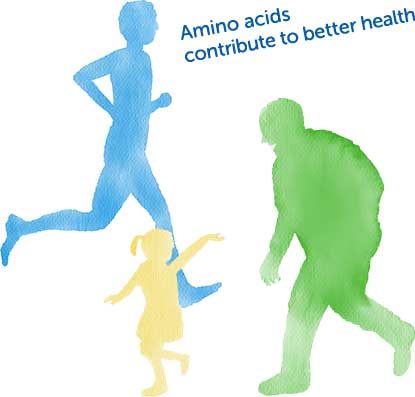
Amino acids contribute to better health and support faster recovery.
When taken before bed, the amino acid glycine helps the body reach deep sleep more quickly. Leucine, one of three essential amino acids known as BCAAs, activates a switch in the body responsible for producing protein. Histidine reduces feelings of fatigue. And cystine and theanine, when taken together, strengthen immunity. These are just a few of the ways amino acids contribute to our physical health. In addition to elucidating the functions of individual amino acids, our research has also revealed how combinations of amino acids, such as cystine and theanine, can have a beneficial effect on the human body.
Creating new functions (reactivity)

Amino acids have a property that makes them highly reactive with various substances.
Amino acids are known for their high reactivity, allowing them to bond with each other to form peptides and proteins, or react with other substances to create new compounds. Leveraging this property, it is possible to develop useful materials with new functions.
Ajinomoto Group Initiatives
Amino acids:
The source of life
Amino acids are essential for all living things
The human body contains roughly 100,000 different kinds of protein, and just 20 amino acids go into making all of them.
Amino acids are not only used to form muscles, bones, skin, and other internal organs, they are also used to make hormones and enzymes that maintain and regulate body processes, antibodies that protect against illness, as well as neurotransmitters.
In other words, amino acids are the source of life.
Because they play such a fundamental role, with the power to sustain life, improve physical health and even make foods more delicious, we can use amino acids to solve global health and nutrition challenges.
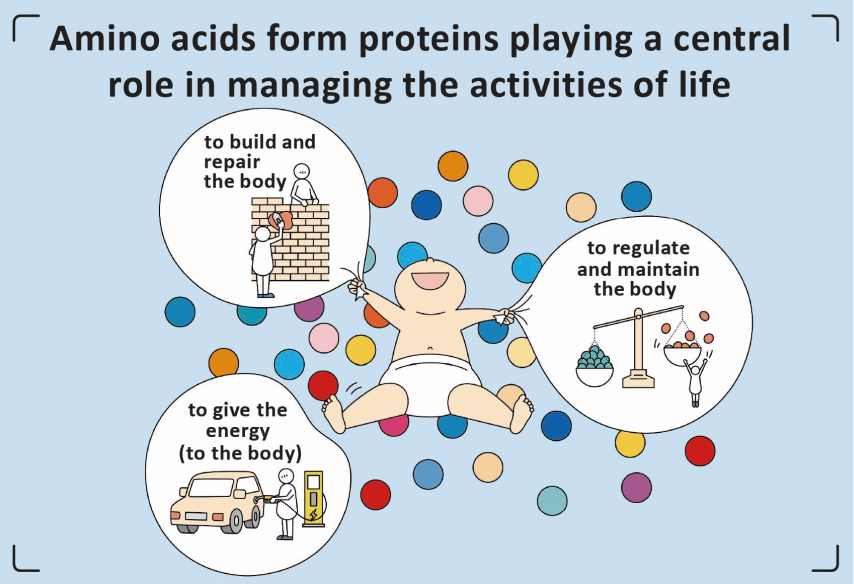
The Ajinomoto Group and amino acids
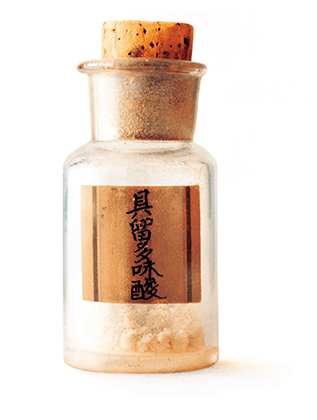
Our business began with the launch of the umami seasoning AJI-NO-MOTO® in 1909.
Chemist Kikunae Ikeda was attempting to discover the secret behind what makes traditional Japanese kombu dashi (kelp broth) so delicious.
Dr. Ikeda succeeded in extracting the amino acid glutamate from kombu dashi and dubbed the new, unnamed taste “umami.” He went on to invent a method of manufacturing a seasoning called AJI-NO-MOTO, using glutamate that could easily be added to foods.
Thus, amino acids, the building blocks of protein, are the foundation of the Ajinomoto Group’s brand. And that is why we are still a leading company in amino acids science today.
Did you know?
Amino acids have a wide range of uses
from animal feed to regenerative medicine, cosmetics, and disease screening.
Nutritionally, amino acids are crucial to all living things—for example, livestock. Adding amino acids to livestock feed can improve the animals’ health and reduce their impact on the environment.
An essential source of nutrition that cells need for building tissues and organs, amino acids also have promising applications in regenerative medicine.
In the cosmetics industry, amino acids are prized for their natural moisturizing properties. Surfactants made from amino acids are used in shampoos and facial cleansers worldwide because they are gentle on both our skin and the environment.
And measuring blood amino acid levels can even help to assess people’s risk for certain illnesses.
The possibilities of amino acids are endless.
